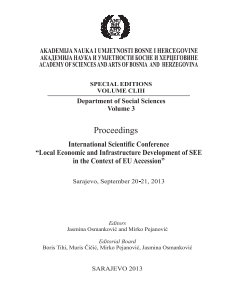POTENTIALS OF THE EU PRE-ACCESSION ASSISTANCE IN FINANCING OF LOCAL ECONOMIC AND INFRASTRUCTURE DEVELOPMENT: EXPERIENCES OF MONTENEGRO IN MFF 2007-2013
POTENTIALS OF THE EU PRE-ACCESSION ASSISTANCE IN FINANCING OF LOCAL ECONOMIC AND INFRASTRUCTURE DEVELOPMENT: EXPERIENCES OF MONTENEGRO IN MFF 2007-2013
Author(s): Gordana Đurović
Subject(s): Politics, Economic history, Economic policy, Transformation Period (1990 - 2010), Present Times (2010 - today), EU-Accession / EU-DEvelopment
Published by: Akademija Nauka i Umjetnosti Bosne i Hercegovine
Keywords: IPA; Infrastructure projects; Local development; Co-financing; Montenegro;
Summary/Abstract: The main aim of the EU instrument for pre-accession assistance (IPA) is to support and assist the candidate countries and potential candidate countries in aligning with the Acquis Communautaire, democratic and economic reforms in countries including infrastructure development, strengthening of local economic development, institutional building including administrative and absorption capacities of local self-government, and improving of regional and cross-border cooperation. IPA support in MFF 2007-2013 will amount to some €11.46bn or €103 per capita in the beneficiary countries (Western Balkans, Turkey and Iceland). For Montenegro, the per capita levels of funding are higher than for the other countries, reflecting a minimum level of funding needed for building adequate central and local administrations, irrespective of the size of the country. Consequently, the EU became the biggest donor in the Western Balkans countries on annual basis. Through the pre-accession assistance based on co-financing principle, the Union significantly supports infrastructure projects, which represent the driving force of the regional and local development. The existence of adequate infrastructure enhances economic development, trade, competitiveness, productivity, economic and social cohesion, as well as better standard of living for the inhabitants of the Western Balkans region. This paper is focused on analysis of IPA programmes in Montenegro in the area of infrastructure and capacity building on local level in the MFF 2007-2013. Main infrastructure projects are defined in the transportation sector (roads, railways) and the environment (water supply, wastewater treatment, and solid waste management) in each IPA budget year, such as support for strengthening of local self-government (capacity building, small infrastructure grants). Based on lessons learned from the previous implementation period it is possible to define challenges ahead for the next 7-years programming period and to define areas of specific interest for future economic development and better regional infrastructure networking.
- Page Range: 343-363
- Page Count: 21
- Publication Year: 2013
- Language: English
- Content File-PDF

